

Study Shows New Diet Lowers Risk of Alzheimer’s. A new diet, known by the acronym MIND, has been found to significantly reduce a person’s risk of developing Alzheimer’s disease (AD), even when the diet is not strictly followed, according to new research published in Alzheimer’s & Dementia: The Journal of the Alzheimer’s Association.
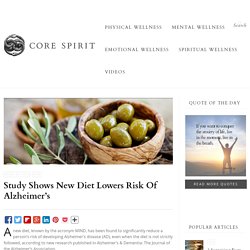
The MIND (Mediterranean-DASH Intervention for Neurodegenerative Delay) diet is a hybrid of the Mediterranean and DASH (Dietary Approaches to Stop Hypertension) diets, both of which have been found to reduce the risk of cardiovascular conditions, including hypertension, heart attack and stroke. The diet was developed by nutritional epidemiologist Martha Clare Morris, Ph.D., of Rush University in Chicago, and her colleagues.
According to the study findings, the MIND diet was able to lower the risk of AD by as much as 53 percent in participants who strictly adhered to the diet, and by about 35 percent in those who followed it fairly well. “I think that will motivate people.” Source: Psych Central. Could cohousing work in Pittwater. From Cohousing Australia’s website: Cohousing and ecovillages are a significant part of the solution to Australia’s housing crisis, addressing the crucial issues of affordability, ecological impact and community building.
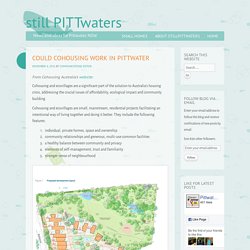
Cohousing and ecovillages are small, mainstream, residential projects facilitating an intentional way of living together and doing it better. They include the following features: individual, private homes, space and ownershipcommunity relationships and generous, multi-use common facilitiesa healthy balance between community and privacyelements of self-management, trust and familiaritystronger sense of neighbourhood. Seniors with access to medical marijuana use fewer prescription drugs [July 07, 2016] ~ Fox News.
Physicians wrote significantly fewer prescriptions for painkillers and other medications for elderly and disabled patients who had legal access to medical marijuana, a new study finds.
![Seniors with access to medical marijuana use fewer prescription drugs [July 07, 2016] ~ Fox News](http://cdn.pearltrees.com/s/pic/th/prescription-perspective-138980283)
In fact, Medicare saved more than $165 million in 2013 on prescription drugs in the District of Columbia and 17 states that allowed cannabis to be used as medicine, researchers calculated. If every state in the nation legalized medical marijuana, the study forecast that the federal program would save more than $468 million a year on pharmaceuticals for disabled Americans and those 65 and older. No health insurance, including Medicare, will reimburse for the cost of marijuana.
Although medical cannabis is legal today in 25 states and the District of Columbia, federal law continues to prohibit its prescription in all circumstances. The new study, published July 6 in Health Affairs, was the first to ask if there’s any evidence that medical marijuana is being used as medicine, said senior author W. Alzheimer's breakthrough: ultrasound successfully treats disease in mice.
Scientists believe they may have found a new weapon in the fight against Alzheimer’s disease – not in the form of a drug but in focused beams of ultrasound.
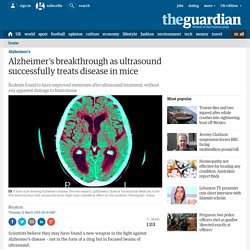
While the approach has only been tested in mice, researchers said on Wednesday it proved surprisingly good at clearing tangles of plaques linked to Alzheimer’s in the animals’ brains and improving their memory, as measured by tests such as navigating a maze. In the past, high-energy ultrasound has been combined with injected microbubbles, which vibrate in response to sound waves, to get drugs across the so-called blood brain barrier. But the new research, published in the journal Science Translational Medicine, is the first demonstration that ultrasound alone might have a beneficial effect on the memory-robbing condition. “Our research was very exploratory and we really didn’t expect to see such a massive effect,” Juergen Goetz of the University of Queensland in Brisbane, one of the study authors, said.
Alzheimer's Disease Is Type 3 Diabetes–Evidence Reviewed. Is Alzheimer's a Form of Diabetes? When the body refuses to make insulin, the condition is called type 1 diabetes; when the body mismanages the hormone, it's known as type 2.
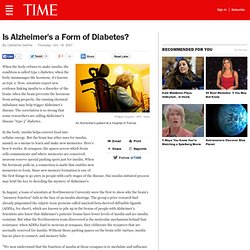
Now, scientists report new evidence linking insulin to a disorder of the brain: when the brain prevents the hormone from acting properly, the ensuing chemical imbalance may help trigger Alzheimer's disease. The correlation is so strong that some researchers are calling Alzheimer's disease "type 3" diabetes. In the body, insulin helps convert food into cellular energy. But the brain has other uses for insulin, namely as a means to learn and make new memories. Here's how it works: At synapses, the spaces across which brain cells communicate and where memories are conceived, neurons reserve special parking spots just for insulin. B-complex vitamins may help slow progression of dementia. Oct. 28, 2010 — Large doses of B-complex vitamins could reduce the rate of brain shrinkage by half in elderly people with memory problems and slow the progression of dementia.
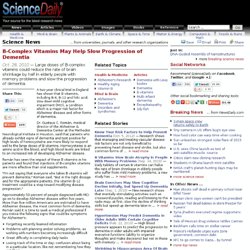
A two-year clinical trial in England has shown that B vitamins, including B-6, B-12 and folic acid, slow down mild cognitive impairment (MCI), a condition which is a major risk factor for Alzheimer disease and other forms of dementia. Dr. Gustavo C. Román, medical director of the Alzheimer & Dementia Center at the Methodist Neurological Institute in Houston, said that patients who already exhibit signs of dementia and test positive for high levels of homocysteine are more likely to respond well to the large doses of B vitamins.
Homocysteine is an amino acid in the blood, and high blood levels are linked to an increased risk of developing Alzheimer disease. More on Natural Substances to Combat Alzheimer’s. Two weeks ago we told you how coconut oil is showing great promise in the treatment of Alzheimer’s disease.
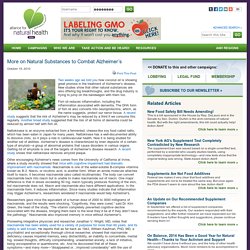
New studies show that other natural substances are also offering big breakthroughs, and the drug industry is trying to jump on the bandwagon with them too. Fish oil reduces inflammation, including the inflammation associated with dementia. The DHA form of fish oil also converts into neuroprotectins, which, as the name suggests, protect our nerve tissue. A recent study suggests that the risk of Alzheimer’s may be reduced by a third if we consume this regularly. Another broad study suggested that the risk of all forms of dementia could be reduced by almost half with fish oil. Nattokinase is an enzyme extracted from a fermented, cheese-like soy food called natto, which has been eaten in Japan for many years. Alzheimer’s-in-a-dish is ‘first clear evidence’ for amyloid hypothesis. A confocal microscope image of an amyloid-beta deposit (red-orange) in 3D neural cell culture (credit: Se Hoon Choi et al.
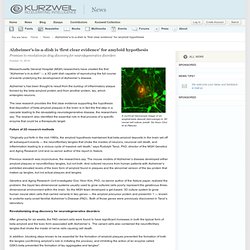
/Nature) Massachusetts General Hospital (MGH) researchers have created the first “Alzheimer’s-in-a-dish” — a 3D petri dish capable of reproducing the full course of events underlying the development of Alzheimer’s disease. Alzheimer’s has been thought to result from the buildup of inflammatory plaque formed by the beta-amyloid protein and from another protein, tau, which entangles neurons. The new research provides the first clear evidence supporting the hypothesis that deposition of beta-amyloid plaques in the brain is in fact the first step in a cascade leading to the devastating neurodegenerative disease, the researchers say. What does an 87% accurate Alzheimer's test mean? Not much without positive predictive value. What does it mean to say that a new test is 87% accurate?
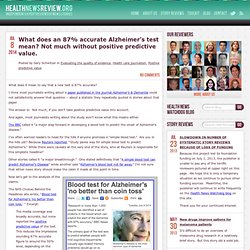
I think most journalists writing about a paper published in the journal Alzheimer’s & Dementia could not satisfactorily answer that question – about a statistic they repeatedly quoted in stories about that paper. The answer is: Not much, if you don’t take positive predictive value into account. And again, most journalists writing about the study won’t know what this means either. The BBC called it “a major step forward in developing a blood test to predict the onset of Alzheimer’s disease.” I’ve often warned readers to head for the hills if anyone promises a “simple blood test.” Other stories called it “a major breakthrough.” NHS Choices “Behind the Headlines” analysis. Researchers have devised a treatment called MEND to reverse Alzheimer’s in Early-stage patients.
The human toll is evident.
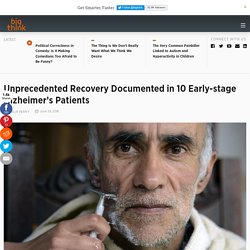
Patients knowing they are going to progressively lose their minds, functionality, and their very lives, must somehow learn to live with the horrifying diagnosis of Alzheimer’s. Meanwhile their families shoulder the burden of care, and the anguish of knowing that someday they will no longer be recognized. Around 5.4 million Americans currently live with this neurodegenerative disorder. Memory Loss From Alzheimer’s Reversed For First Time With New Approach — PsyBlog. Nine out of ten patients with memory problems showed improvements with this novel multi-systems approach. Memory loss in patients with Alzheimer’s disease may be reversed — and the improvement sustained — using a novel treatment approach, a small exploratory study has found. The study, which included 10 patients, used a combination of therapies which were personalised to help them reverse memory loss (Bredesen, 2014).
Some patients were getting disoriented while driving, others mixing up names and some had been forced to quit their jobs. Within three to six months of the treatment all but one of the patients was seeing either objective or subjective improvements in their memory. Those who had been forced to quit work were able to return. One of the patients was a 55-year-old attorney who had been suffering memory loss for four years, but showed a remarkable improvement from the program: Professor Dale Bredesen, who authored the study, explained that the key is taking a multi-systems approach: New Alzheimer’s treatment fully restores memory function. Australian researchers have come up with a non-invasive ultrasound technology that clears the brain of neurotoxic amyloid plaques - structures that are responsible for memory loss and a decline in cognitive function in Alzheimer’s patients.
If a person has Alzheimer’s disease, it’s usually the result of a build-up of two types of lesions - amyloid plaques, and neurofibrillary tangles. Amyloid plaques sit between the neurons and end up as dense clusters of beta-amyloid molecules, a sticky type of protein that clumps together and forms plaques. Neurofibrillary tangles are found inside the neurons of the brain, and they’re caused by defective tau proteins that clump up into a thick, insoluble mass.
This causes tiny filaments called microtubules to get all twisted, which disrupts the transportation of essential materials such as nutrients and organelles along them, just like when you twist up the vacuum cleaner tube. NTU scientists discover new treatment for dementia. Pushing new frontiers in dementia research, Nanyang Technological University, Singapore (NTU Singapore) scientists have found a new way to treat dementia by sending electrical impulses to specific areas of the brain to enhance the growth of new brain cells. Known as deep brain stimulation, it is a therapeutic procedure that is already used in some parts of the world to treat various neurological conditions such as tremors or Dystonia, which is characterised by involuntary muscle contractions and spasms. NTU scientists have discovered that deep brain stimulation could also be used to enhance the growth of brain cells which mitigates the harmful effects of dementia-related conditions and improves short and long-term memory.
Their research has shown that new brain cells, or neurons, can be formed by stimulating the front part of the brain which is involved in memory retention using minute amounts of electricity. Growing new brain cells Media contact: For more information, visit. New Study Suggests Alzheimer's Is Associated with Brain Fungus. Compound In Cannabis Shown To Remove Toxic Alzheimer’s Protein From The Brain. By Alanna Ketler, Collective Evolution. How Whole Turmeric Heals The Damaged Brain. Long considered impossible to accomplish, new research reveals how a simple spice might contribute to the regeneration of the damaged brain. Turmeric is hands down one of the, if not the, most versatile healing spice in the world with over 600 experimentally confirmed health benefits, and an ancient history filled with deep reverence for its seemingly compassionate power to alleviate human suffering. But, most of the focus over the past decade has been centered on only one of its many hundreds of phytocompounds: namely, the primary polyphenol in turmeric known as curcumin which gives the spice its richly golden hue.
This curcumin-centric focus has lead to the development of some very good products, such as phospholipid bound curcumin concentrate (e.g. Meriva, BCM-95) which greatly helps to increase the absorption and bio-activity of curcumin. Truth be told, there is no singular ‘magic bullet’ in foods and herbs responsible for reproducing the whole plant’s healing power. Sugar Harms Your Brain Health, Drives Alzheimer’s Epidemic. By Dr. Dementia Risk Linked with Common Medications. Monday, June 20, 2016 By: Linda J. Dobberstein, Chiropractor, Board Certified in Clinical Nutrition. Alzheimer’s experts say dementia cases will nearly triple by 2050. Coconut Oil & Peanut Butter: New Advances for Alzheimer's. Defeating aging, and the avenues ahead of us: Part 2. With a clear way forward, what are we waiting for?
If we get this done, then we can probably live indefinitely. Can humans be so mentally slothful and negligent that they would be able to do all kinds of things on microscopic scales and yet not be able to clear damage out of biology? Copper Triggers the Onset of Alzheimer’s Disease. Is Coconut Oil a Treatment for Alzheimer's Disease? Brain Foods That Fight Alzheimer's. NETWORKING FOR A CURE. Brains flush toxic waste in sleep, including Alzheimer’s-linked protein, study of mice finds. While we are asleep, our bodies may be resting, but our brains are busy taking out the trash. Alzheimer’s Disease Completely Reversed In One Week In Mice Using New Protein Injection - RiseEarth.
By Arjun WaliaCollective Evolution. Magnesium ions show promise in slowing progression of Alzheimer's disease in mice. Poor sleep linked to toxic buildup of Alzheimer's protein, memory loss. Alzheimer's may be a collection of diseases that should be treated separately. New Alzheimer’s disease drug trial set to start in Australia. News - Link between vitamin D and dementia risk confirmed - Medical School - University of Exeter. Alzheimer's Disease and Dementia. Welsh scientists make major Alzheimer’s breakthrough. ALZHEIMER PLAQUES ARE BIOFILM COMMUNITIES OF BORRELIA. Heart Health. Health and Healing..
Mental Health. Alternative medicine. Truthearth.